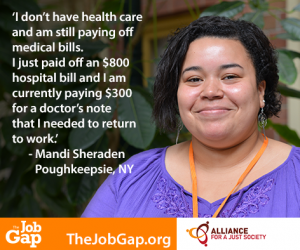 Debt – it’s become so entrenched in our daily lives that it’s almost a given. Debt is often a choice for higher income families, as an investment in the form of a mortgage or as a means to help pay for college.
Debt – it’s become so entrenched in our daily lives that it’s almost a given. Debt is often a choice for higher income families, as an investment in the form of a mortgage or as a means to help pay for college.
However, lower-income households often end up in debt because their incomes leave them living paycheck-to-paycheck without a cushion for even minor incidentals. When an someone gets sick, the doctor bills pile up. If they attend college to improve their job opportunities, the student loan debt piles up.
It is an impossible balance sheet, resulting in families cutting back on necessities like health care, meals, or heat in the winter as they try to scrape by.
Today, Alliance for a Just Society released Families Out of Balance, the first report in the 2014 Job Gap Economic Prosperity Series. The report shows exactly how dramatically lower-income workers are disproportionately burdened by debt.
In addition, the reports shows that minimum wages in 10 states studied across the country fall far short of a living wage – even without adding debt to the equation.
In their research for the Alliance report, Ben Henry, senior policy associate and Allyson Fredericksen, policy associate, found that in 7 out of 10 states studied, the state minimum wage is less than half of the living wage needed for a single adult to live a no-frills lifestyle and put away a small amount of savings. In none of the states studied does the minimum wage provide even one-third of the living wage for a single adult with two children.
Our new report also includes findings that lower-income workers have less income per dollar of debt and fewer savings or other assets to fall back on. It makes for difficult kitchen table conversations as families decide what to sacrifice to pay their bills.
Yet, despite the hardships, our study shows that 89 percent of low-income families prioritize paying their bills on time.
Working families are doing their best to balance their budgets with limited means, stretching their paychecks to the limit and making tough choices on what to cut each month. Now it’s time for local, state and national legislators to reinvest in families.
Here are a few ways to get started, more details can be found in Families Out of Balance:
• Increase the federal minimum wage
• Abolish the federal tipped minimum wage
• Reinvest in higher education
• Address medical debt acquired before the Affordable Care Act
• Expand Medicaid eligibility
• Regulate payday lending
Strong families mean a strong economy. Families shouldn’t just survive – let’s help every working family thrive.